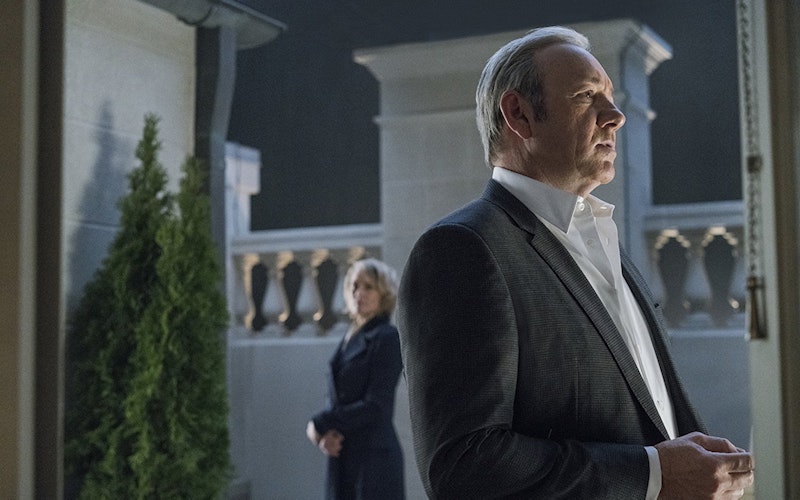
Culture At Large
Sexual Misconduct and Hollywood’s House of Cards
In the wake of numerous allegations involving sexual misconduct by movie mogul Harvey Weinstein, the #metoo hashtag has—“like the falling of small stones that starts an avalanche in the mountains”—empowered a deluge of women and some men to share their stories of sexual abuse or harassment. Each private, visceral, terrible experience seems to share one thing in common: the exploitation of power.
Perhaps no Hollywood enterprise has come to be more emblematic of this abuse of power than House of Cards—both onscreen and off. Kevin Spacey’s President Frank Underwood is the antihero we hate to love, the sinner for whom we cheer. Frank and his wife Claire (Robin Wright) are breathtakingly cunning as they plot and claw their way up the political ladder, with no regard or compassion for those they obliterate as they ascend. Frank (with Claire’s approval) involves himself in an affair with a young female reporter, only to push her in front of a train when she becomes a liability. He and Claire engage in seemingly consensual sex with their Secret Service agent in order to satisfy loyalties. Claire crushes her lover’s reputation when hers is at stake, and she goes so far as to murder another lover when he becomes untrustworthy. Each of these victims is portrayed as a necessary casualty, as Frank and Claire continue their nuclear rise.
With the recent flood of allegations of sexual misconduct against Spacey himself, I now feel a certain level of conviction when I consider my participation in the House of Cards fandom. When constrained to the small screen, Frank Underwood demonstrates the brokenness of the world and the seedy underbelly of American politics. But when Spacey sheds Frank’s skin only to reveal a frighteningly similar monster underneath, House of Cards takes on a degree of reality that leaves me disgusted.
Frequently, sexual predators, abusers, and harassers seem to go unpunished, profiting from a systemically rotten culture that enables their behavior. Society too often ignores the men and women who have been defamed, manipulated, harmed, and silenced. And so the testimonies and solidarity that make up the #metoo campaign have been a welcome form of justice, allowing the abused to come forth in safety, knowing they are neither isolated nor blamed for what has been done to them.
But we cannot stop there.
Empires built upon abuse will eventually crumble.
First, we as Christians cannot turn a blind eye to the abuse of power (including sexual abuse) that exists in the Church. It’s so easy for us to see this evil thriving in Hollywood and to ignore the manipulation and sin happening in our own pews. Terribly, this abuse of power by way of sex isn’t only a Hollywood problem, as #metoo testimonies involving the Church have made clear. We must acknowledge that our Christian institutions and communities are not insulated from this sort of sin, and then we must act in response: by holding leaders accountable and creating an environment where painful stories from those who have been mistreated can be honored, listened to, and fully investigated.
As Christians, we also know the Bible instructs us on how to wield power. This should be our model for anyone in a position of authority. In Matthew, Jesus told his disciples: “You know that the rulers of the Gentiles lord it over them, and their high officials exercise authority over them. Not so with you. Instead, whoever wants to become great among you must be your servant, and whoever wants to be first must be your slave—just as the Son of Man did not come to be served, but to serve, and to give his life as a ransom for many.” Within the Church and without, we must hold those in power to the highest standards of servant leadership, not allowing them free passes, blind eyes, or undeserved trust.
Even as we do this work, we need to consider the ultimate promise of truth and justice also given to us in Scripture. Though many of those who have used their power to abuse others, sexually and otherwise, will live out this life unpunished, their ways will not go unnoticed by our just God. Proverbs reminds us that “whoever conceals their sins does not prosper,” while Psalm 69 assures us that “You, God, know my folly; my guilt is not hidden from you.” Whether those who abuse their power acknowledge it or not, their day of reckoning is coming.
Which brings us back to House of Cards. Although the series chronicles Frank Underwood’s rise despite—and in some cases, because of—his abusive behavior, it also acknowledges in its very title that such evil can’t hold. Empires built upon abuse will eventually crumble, and indeed Netflix has cut ties with Spacey and cancelled the show. What’s more, Spacey’s supporting scenes in the upcoming Ridley Scott film, All the Money in the World, will be cut and reshot with Christopher Plummer.
More stories of harassment and abuse keep coming. Even as I write, separate allegations involving sexual misconduct are unfolding about comedian Louis C.K. and aspiring senator Roy Moore. As these cases and others are investigated, may justice be done. And may more brave souls come forward to bring the sins of abusers into the light, reminding us that even in this broken world, the awful abuse of power will only ever amount to a house of cards.
Topics: Culture At Large